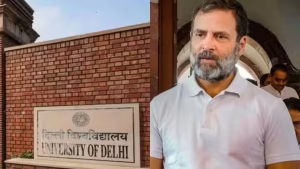
The visit was met with opposition from the university, which described it as a “breach of institutional protocol” and a disturbance of student governance activities.
According to Professor Rajni Abbi of the university’s Proctor office, this was Gandhi’s second unannounced visit to DU.
Gandhi’s Visit to Delhi University Focuses on Representation and Equality
During his hour-long visit to Delhi University, Rahul Gandhi engaged in discussions with students from Scheduled Castes (SCs), Scheduled Tribes (STs), and Other Backward Classes (OBCs) as part of his ‘Shiksha Nyay Samvad’ initiative. The conversation centered around representation, equality, and academic justice.
However, controversy emerged as the university administration claimed that access to the Delhi University Students’ Union (DUSU) office was restricted during Gandhi’s visit. According to the university, security cordoned off the area, allegedly locking some students inside the office.
Allegations and Responses:
DUSU Secretary Mitravinda Karanwal was allegedly denied entry to her office, which she said was due to “VVIP protocol.”
The university claimed that members of the National Students’ Union of India (NSUI), affiliated with the Congress, misbehaved with students.
In response, the university condemned the incident and warned of strict disciplinary action.
DUSU President’s Defense:
DUSU President Ronak Khatri defended the visit, calling it peaceful and legitimate.
He asserted that no academic or legal rule mandates prior permission for informal guest visits.
Khatri criticized the university’s statement, calling it an act of “administrative overreach” and claimed it was politically motivated.
Political Reactions:
The Akhil Bharatiya Vidyarthi Parishad (ABVP), affiliated with the Rashtriya Swayamsevak Sangh, labeled Gandhi’s visit as “bad theater”.
ABVP criticized the event for allegedly involving only NSUI members and claimed it lacked transparency.
DUSU Secretary Karanwal stated she was granted access only after a prolonged argument, suggesting selective exclusion during the visit.